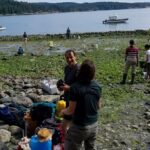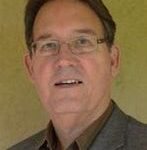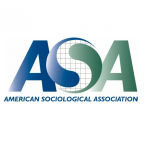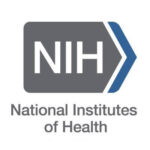*New* Data Access With Federal Administration’s Transition
|
The UW libraries is maintaining a Library Guide about Federal Data Access. You can find that page here.
The challenges of data access during federal administrative transitions can happen every four years. What follows are some resources that might be useful. We will continue to update this blog post with new information. If you have any links that could be helpful, please send csde@uw.edu your updated and helpful information. We know that what follows may not provide you with the exact data you need, so let us know what you need and what’s missing and we can try to find where it is located. If you have data that needs hosting, we can also provide you with suggestions for where to do so at UW.
Every four years an endeavor takes place to refresh the End of Term Web Archive. It’s a coordinated project to archive parts of the federal web before the end of a presidential term. See this website. It is currently processing 300 TB of the last administration’s public administration files. Another place to look is the Way Back Machine. The Data Rescue 2025 Github site is one place to learn about what has been rescued and how to rescue data.
The UW libraries has freely available government datasets ingested into UW Libraries-licensed databases like Sage Data, Simply Analytics, and others with lock icons next to them here. The libraries team of federal data librarians can be contacted at that site, if you have questions about what is available.
One place to check for some available demographic data are the resources at the University of Minnesota. Additionally, the Inter-University Consortium of Political and Social Research (ICPSR) at the University of Michigan provides DataLumos which is a crowd-sourced and open-source resource for government data archiving. There is also the Public Environmental Data project that will soon have about 52 massive datasets coming online. You might also check data repositories like the UW Dryad collection for environmental science data and publications.
(read more) |
 |
*New* Cultural Anthropology Methods Program (CAMP) Launched
|
In collaboration with six global partners, Methods4All recently announced the launch of a Cultural Anthropology Methods Program (CAMP) International Curriculum & Community of Practice. Spanning 15 methods modules, there are 50 free YouTube methods lectures that offer the best methodological guidance our nationally-selected Distinguished Teaching Faculty has to offer. All lectures are available in English and captioned in 9 languages. Learn more here.
(read more) |
 |
NWFSRDC News and Highlights Corner – Explore Our New Website!
|
CSDE is excited to announce the launch of the new Northwest Federal Statistical Research Data Center (NWFSRDC) website! Our revamped platform features a user-friendly interface and offers comprehensive resources to learn about this unique data resource at the UW. The NWFSRDC provides physical and/or virtual access to non-public data collected by U.S. government agencies. Over 200 microdata resources from 16 government agencies are accessible through the NWFSRDC.
(read more) |
 |
IPUMS Data Remain Available
|
On Friday, January 31, federal agencies removed public data and documentation previously made available via public-facing federal government websites in response to administration directives. The types of data removed include large-scale population data sources that provide vital insight into the health and wellbeing of all communities. The IPUMS team recently reported that their data remain available, and that IPUMS remains committed to preserving and democratizing access to the world’s population data.
(read more)
|
 |
ASPIRE Equitable Exchange Virtual Discussion Series
|
A new NSF-funded project, Active Societal Participation in Research and Education (ASPIRE), which seeks to advance equitable, community-based approaches to geoscience (including earth, ocean, atmosphere, marine, polar) practiced within academic settings. There are many activities within ASPIRE, the first of which is our Equitable Exchange Virtual Discussion Series. This interactive webinar series (7 sessions, we encourage you to attend all!) is for anyone curious about community engagement, through to those looking for a space to discuss their deep experience navigating co-produced research.
(read more)
|
 |
Evans School Research Seminar to Host Dr. Dowell Myers (2/11/25)
Next week, the Evans School will host Dr. Dowell Myers from the Sol Price School of Public Policy at the University of Southern California. In the research seminar, he will present a paper about housing policy: Extending Analysis of the Great Misalignment Between Housing and Population. Please note that this is a Tuesday event. CSDE and the College of Built Environments (CBE) are co-hosting this seminar. To sign up for meetings with Dr. Myers, please follow this link.
(read more)
|
 |
CS&SS Seminar on the Limits of Traditional Null Hypothesis Testing (2/12/25)
|
At the weekly seminar hosted by the Center for Statistics and the Social Sciences (CSSS), Dr. Yuichi Shoda (Psychology) will present on the limits of traditional null hypothesis significance testing in scientific endeavors. For example, increasing the precision of a study (e.g., by increasing the sample size) makes it easier to find statistical significance, with the result that any theory predicting a non-zero effect is considered supported—even if it explains only a small portion of the phenomenon of interest. This is not the case when using the "null regions framework" if the observed value falls within the “null region”—the range of population values that researchers aim to rule out (e.g., effects or associations that are too small to matter, even if not exactly zero). This framework provides tests to address questions such as: “Is the effect strong enough to matter?” and “Is the effect close enough to the predicted value to suggest that the theory that predicted it should be retained?” Learn more here.
(read more) |
 |
Two Upcoming Webinars from the Center for Aging, Climate, & Health (CACHE)
|
We are excited to share the dates and details for two upcoming seminars from the Center for Aging, Climate and Health (CACHE). The February Virtual Seminar (2/18/25) will be on “Social & Environmental Data Integration at the U.S. County Scale” and the March Virtual Seminar (3/19/25) will be on “Measuring Extreme Temperatures and Thermal Comfort in Aging and Demographic Research.” CACHE is a new virtual center collaboration between the Institute for Demographic Research (CUNY), CSDE & IHME (UW), the CU Population Center (CU), the Minnesota Population Center (UM), and the Center for Demographic, Urban, and Environmental Studies (El Collegio de Mexico). Learn more and register here.
(read more)
|
 |
Biomarker Working Group Winter Quarter Meetings
|
The CSDE Biomarker Working Group is a forum for discussions of practical and theoretical issues associated with collecting and using biomarker data in social and behavioral science research. This working group is open to all students, faculty, and staff and meets on the first Thursday of each month. Subscribe to the mailing list here!
Winter Quarter meetings: Dates: March 6
Time: 12:00-1:00 pm
Location: Raitt 223
Organizer: Tiffany Pan (tpan@uw.edu)
(read more)
|
 |
CSDE Science Core: Upcoming Workshops
|
Each quarter, CSDE offers 3-5 workshops on data sources, statistical and biomarker methodology, introductions to analysis programs, and more, all given by CSDE staff and faculty affiliates.
Check out the winter workshop offerings here!
(read more) |
 |
*New* Social Science Research Council Virtual Lecture by Lawrence Katz (2/27/25)
|
On February 27th, Professor Lawrence Katz (Harvard University) will present a virtual lecture hosted by the Social Science Research Council entitled “Neighborhood Effects, Housing Mobility, and Place-Based Policies: Evidence from Experiments and Quasi-Experiments.” This lecture will cover his work on three landmark projects: Moving to Opportunity, enabling residents of public housing to move to lower-poverty neighborhoods; Creating Moves to Opportunity, providing additional support to families considering leaving high-poverty neighborhoods; and HOPE VI revitalization grants, investing in mixed-income developments in neighborhoods with distressed public housing.
(read more) |
 |
*New* ASA Sociology of Population Section Student Paper Award (3/1/25)
|
The American Sociological Association’s Sociology of Population section is accepting nominations for the best student paper in the sociology of population. This award consists of a certificate and $500 award. The paper must use a sociological perspective to address an issue of relevance to contemporary demography, broadly construed; purely technical papers are not eligible. The paper can be published or unpublished and should be article-length (approximately 40 pages including tables and figures). Papers can be sole-authored or have multiple student authors.
(read more) |
 |
Penn State Population Research Institute Invites External Fellow Applicants (3/5/25)
|
The Population Research Institute (PRI) recently announced a call for applications to the 2025-2027 External Fellows Program. The PRI will welcome a second cohort of the External Fellows grant writing program to PRI’s University Park campus in May 2025. External Fellows will receive support from PRI to prepare a grant for submission to the National Institute of Health’s Eunice Kennedy Shriver National Institute of Child Health and Human Development.
(read more)
|
 |
Royalty Research Fund Invites Proposals (3/5/25)
|
The Office of Research invites applications for the next round of the Royalty Research Fund (RRF) grant program. Proposals are due to RRF Monday, March 3, 2025 by 5:00 PM. Departments and Colleges/Schools may have earlier deadlines, so all applicants are advised to check with their program’s administrative staff. Awards will be announced by June 15, 2025.
(read more) |
 |
*New* Call for Proposals, Simpson Center First Book Fellowship (3/7/25)
|
In recognition of the challenges faced by early career tenure-track faculty, and in response to the very positive reception of our faculty summer fellowship program, the Simpson Center will offer support for First Books during the summer of 2025.
The Center will offer summer salary funding (with $1,500 additional research budget) for assistant professors to give intensive attention to first book manuscripts that are near completion. Applicants may propose, for example, to finish revisions before submitting the entire manuscript to a press for the first time, or to undertake late-stage revisions in response to peer-review feedback. In general, we seek to support faculty who will have made substantial progress on their first book by the beginning of the fellowship term. The deadline for proposals is Friday, March 7, 2025. We expect to award support to 6 faculty members.
(read more) |
 |
Apply for the Robert Wood Johnson Foundation Health Policy Scholars Program (3/11/25)
|
The RWJF Health Policy Research Scholars is a leadership development program for full-time doctoral students from historically marginalized backgrounds who can connect how their background, identity, or lived experiences have positioned them to contribute to the goals of the program, including bringing unique and diverse perspectives to their research. In 2025, HPRS is selecting up to 40 doctoral students who are beginning their second year in fall 2025 in a full-time doctoral program and do not expect to graduate before spring/summer 2028.
(read more) |
 |
Sign up to join the Early Career listserv!
|
We invite early career faculty affiliates to join our new mailing list, csde_earlycareer. Among other things, this is the way to find out info about our quarterly Early Career Affiliate happy hours, and you won’t want to miss those! These will be a great way to meet up with other junior scholars in a fun and casual atmosphere over snacks and drinks.
(read more) |
 |
Call for Research Proposals: Understanding the School Food Workforce Subgrants (due 2/14/25)
|
The U.S. Department of Agriculture Food and Nutrition Service, the University of Wisconsin-Madison, Food Insight Group, and Chef Ann Foundation recently announced a Request for Research Proposals entitled “Understanding the School Food Workforce Subgrants.” The group is looking for research projects that will increase understanding of the current state of the K-12 school food workforce in the United States and/or explore strategies to create a stable and respected workforce that can provide healthy meals to students while supporting resilient local and regional food systems.
(read more) |
 |
Statistical Horizons Course on How to Choose a Model for Longitudinal Data (2/20 – 2/22/25)
|
With a seemingly endless range of possible models to analyze longitudinal data, how do you select the best one? This seminar from Statistical Horizons (taught by Kenneth A. Bollen) will address that question, providing you with practical tools to evaluate and select the most suitable longitudinal model. Learn more and access sample course materials here.
(read more) |
 |
ICPSR Summer Scholarships in Quantitative Methods Now Available (2/28/25)
| Scholarships for the 2025 Inter-university Consortium for Political and Social Research (ICPSR) Summer Program are now open! These scholarships cover one of our General Sessions, where you can curate your own schedule of methods training to fit what you need for your research and goals.
View the full list of scholarships that we offer, along with scholarships offered in partnership with other organizations.
(read more) |
 |
RSF Letters of Inquiry (Due 3/11/25)
RSF Call for Proposals from Early-Career Scholars – Causal Research on Criminal Justice System (Due 4/3/25)
|
The Russell Sage Foundation (RSF) and Arnold Ventures recently announced a collaborative call for causal research on the criminal justice system. Criminal justice policies and practices include the work of the police, courts, jails, prisons, probation and parole, and immigration detention. Proposals must include causal research designs that can reliably isolate the treatment effects of a policy, practice, or intervention such as difference-in-differences, regression discontinuity, instrumental variables, and randomized controlled trials.
(read more) |
 |
Updating the Definition of Sexual and Gender Minority Populations in NIH-Supported Research
|
Statistics indicate that as of 2024, nearly eight percent of the U.S. population identifies as LGBT, with much of this growth attributed to increases in LGBT identification among younger generations. In recent years, policies and laws have been enacted in support of LGBTQI+ communities and their well-being. For example, the 21st Century Cures Act included provisions for the NIH Director to encourage efforts to improve research related to the health of sexual and gender minority (SGM) populations, including to increase participation of SGM populations in NIH-supported clinical research and to facilitate the development of methods for conducting SGM research. SGM people were designated as a population with health disparities for NIH research in 2016 by the Director of the National Institute on Minority Health and Health Disparities in consultation with the Director of the Agency for Healthcare Research and Quality. The NIH SGM health research portfolio has steadily grown and diversified since 2015.
However, members of SGM communities still face unique and significant disparities and barriers across domains such as physical, mental, and behavioral health; social and structural determinants of health; and healthcare access and quality. This includes higher SGM group-specific rates of and risks for some chronic health conditions (e.g., arthritis, asthma, cardiovascular disease, diabetes, certain forms of cancer, and HIV/AIDS), depression, anxiety, eating disorders, substance use, smoking, stigma, discrimination, bullying, using preventive health services less frequently, and negative experiences in healthcare settings.
(read more) |
 |
CSDE Population Research Planning Grants (PRPGs) (Rolling deadline)
|
Population Research Planning Grants (PRPGs) are designed to provide in-kind support and/or funds of up to $25k* to support a wide array of activity types throughout the development of a research project. As part of our mission to complement rather than duplicate other campus opportunities such as the Population Health Initiative seed grants, we will consider funding things activities such as the use of CSDE services beyond the standard allotments for affiliates.
(read more) |
 |
CSDE Matching Support to Supplement On-campus Funding (Rolling deadline)
|
CSDE Matching Support includes in-kind or monetary support to accompany a submission to other on-campus funding mechanism, such as PHI, EarthLab, or Urban@UW. All projects must have a CSDE affiliate who is UW faculty and is listed as a PI or co-PI, with any number of other collaborators. Note that we require (PRPGs) or strongly suggest (matching funds) contacting either Development Core Director (Steven Goodreau) or CSDE Director (Sara Curran) to discuss possibilities for your specific proposal before submission.
(read more) |
 |
NSF: Proposals Impacting Tribal Nation Resources & Interests
|
As of 5/20/2024, NSF proposals that may impact the resources or interests of a federally recognized Tribal Nation will not be awarded by NSF without prior written approval from the official(s) designated by the relevant Tribal Nation(s).
Proposers must:
- Seek guidance from the potentially impacted Tribal Nation on activities that require review and prior approval from that Tribal Nation’s authorized designee.
- Submit a written request to the relevant Tribal Nation (based on their guidance), for approval to carry out the proposed activity that requires their review and approval.
- Complete the checkbox for “Potential Impacts on Tribal Nations” on the Cover Sheet. Note, lead organizations are responsible for this on collaborative proposals & proposals with subawards considered a single unified project.
- Upload one of the following into "Other supplementary documents" of Research.gov:
- a copy of the written request to the relevant Tribal Nation to carry out any proposed activity/activities that may require prior approval from them
- written confirmation from the Tribal Nation(s) that review and approval is not required
- a copy of relevant Tribal Nation approval
(read more) |
 |
Overview of Grant Application and Review Changes for Due Dates on or after January 25, 2025
|
This notice provides the research and research training community an overview of application and peer review changes impacting grant applications submitted for due dates on or after January 25, 2025, including:
- Simplified Review Framework for Most Research Project Grant Applications
- Revisions to the NIH Fellowship Application and Review Process
- Updates to Reference Letter Guidance
- Updates to NRSA Training Grant Applications
- Updated Application Forms (FORMS-I)
- Common Forms for Biographical Sketch and Current and Pending (Other) Support
(read more) |
 |
|
|



